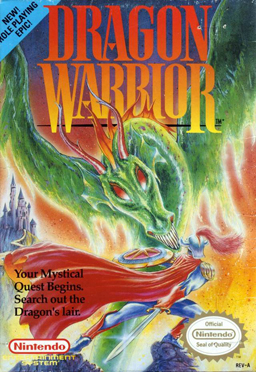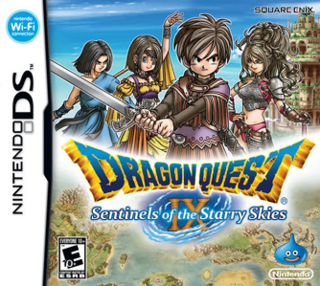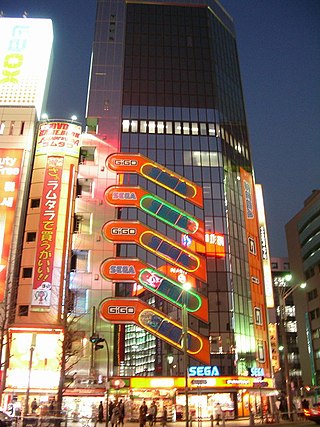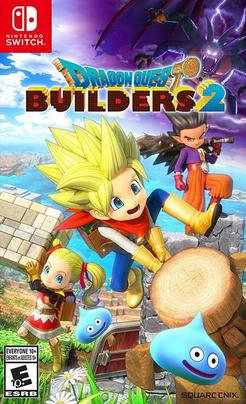
EverQuest is a 3D fantasy-themed massively multiplayer online role-playing game (MMORPG) originally developed by Verant Interactive and 989 Studios for Windows PCs. It was released by Sony Online Entertainment in March 1999 in North America, and by Ubisoft in Europe in April 2000. A dedicated version for Mac OS X was released in June 2003, which operated for ten years before being shut down in November 2013. In June 2000, Verant Interactive was absorbed into Sony Online Entertainment, who took over full development and publishing duties of the title. Later, in February 2015, SOE's parent corporation, Sony Computer Entertainment, sold the studio to investment company Columbus Nova and it was rebranded as Daybreak Game Company, which continues to develop and publish EverQuest.
Dragon Quest, previously published as Dragon Warrior in North America until 2005, is a series of role-playing games created by Japanese game designers Armor Project, Bird Studio and Sugiyama Kobo to its publisher Enix, with all of the involved parties co-owning the copyright of the series since then. The games are published by Square Enix since its inception, with localized remakes and ports of later installments for the Nintendo DS, Nintendo 3DS, and Nintendo Switch being published by Nintendo outside of Japan. With its first game published in 1986, there are eleven main-series games, along with numerous spin-off games. In addition, there have been numerous manga, anime and novels published under the franchise, with nearly every game in the main series having a related adaptation.

Neverwinter Nights is a third-person role-playing video game developed by BioWare. Interplay Entertainment was originally set to publish the game, but financial difficulties led to it being taken over by Infogrames, who released the game under their Atari range of titles. It is the first installment in the Neverwinter Nights series and was released for Microsoft Windows on June 18, 2002. BioWare later released a Linux client in June 2003, requiring a purchased copy of the game to play. MacSoft released a Mac OS X port in August 2003.

A role-playing video game, commonly referred to as a role-playing game (RPG) or computer role-playing game (CRPG), is a video game genre where the player controls the actions of a character immersed in some well-defined world, usually involving some form of character development by way of recording statistics. Many role-playing video games have origins in tabletop role-playing games and use much of the same terminology, settings and game mechanics. Other major similarities with pen-and-paper games include developed story-telling and narrative elements, player character development, complexity, as well as replay value and immersion. The electronic medium removes the necessity for a gamemaster and increases combat resolution speed. RPGs have evolved from simple text-based console-window games into visually rich 3D experiences.

Dragon Quest, titled Dragon Warrior when initially localized to North America, is a role-playing video game developed by Chunsoft for the Nintendo Entertainment System. It was released by Enix in Japan in 1986 and by Nintendo in North America in 1989. It is the first game in the Dragon Quest video game series. Dragon Quest has been ported and remade for several video game platforms, including the MSX, MSX2, PC-9801, Super Famicom, Game Boy Color, Nintendo 3DS, PlayStation 4, mobile phones, and Nintendo Switch as of 2019. The player controls the hero character who is charged with saving the Kingdom of Alefgard and rescuing its princess from the evil Dragonlord. Dragon Warrior's story became the second part in a trilogy, with several spinoff anime and manga series.

Baldur's Gate II: Shadows of Amn is a role-playing video game developed by BioWare and published by Interplay Entertainment. It is the sequel to Baldur's Gate (1998) and was released for Microsoft Windows in September 2000. Like Baldur's Gate, the game takes place in the Forgotten Realms—a fantasy campaign setting—and is based on the Advanced Dungeons & Dragons 2nd edition rules. Powered by BioWare's Infinity Engine, Baldur's Gate II uses an isometric perspective and pausable real-time gameplay. The player controls a party of up to six characters, one of whom is the player-created protagonist, while the others are certain characters recruited from the game world.

Dragon Quest VIII: Journey of the Cursed King is a role-playing video game developed by Level-5 and published by Square Enix for the PlayStation 2. It was released in Japan in 2004, in North America in 2005 and PAL regions in 2006, making it the first main series installment released in the PAL region. It is the eighth installment of the Dragon Quest series and it is the first English version of a Dragon Quest game to drop the Dragon Warrior title. A version of the game for Android and iOS was released in Japan in December 2013, and worldwide in May 2014.

Dragon Quest IX: Sentinels of the Starry Skies is a role-playing video game co-developed by Level-5 and Square Enix for the Nintendo DS. Published by Square Enix in Japan in 2009, and by Nintendo overseas in 2010, it is the ninth mainline entry in the Dragon Quest series. The storyline follows the protagonist, a member of the angelic Celestrian race, after a disaster in their home scatters magical fruits across the mortal realm. While carrying over traditional gameplay from the rest of the series with turn-based battles, the game is the first Dragon Quest entry to feature a customizable player character, and the first to include a multiplayer mode, with the option of trading treasure maps and loaning player characters through Nintendo Wi-Fi. Online functions ended in 2014 when it ceased operations.

Dragon Quest X: Awakening of the Five Walkers Online, also known as Dragon Quest X Online, is a massively multiplayer online role-playing game (MMORPG) developed and published by Square Enix. It is the tenth mainline entry in the Dragon Quest series. It was originally released for the Wii in 2012, and was later ported to the Wii U, Windows, PlayStation 4, Nintendo Switch, Android, iOS, and Nintendo 3DS, all of which support cross-platform play. Other than a discontinued Windows version in Chinese, the game was not localized outside of Japan.

Video games are a major industry in Japan, and the country is considered one of the most influential in video gaming. Japanese game development is often identified with the golden age of video games, including Nintendo under Shigeru Miyamoto and Hiroshi Yamauchi, Sega during the same time period, Sony Computer Entertainment when it was based in Tokyo, and other companies such as Taito, Bandai Namco Entertainment, Capcom, Square Enix, Konami, NEC, and SNK, among others.

Dragon's Dogma is a 2012 action role-playing hack and slash video game by Capcom. First released for the PlayStation 3 and Xbox 360, an enhanced version subtitled Dark Arisen was later released for Windows, PlayStation 4, Xbox One, and Nintendo Switch. Set in Gransys, a high fantasy world inspired by Sicily, the player takes on the role of a human protagonist dubbed the Arisen on a quest to defeat the dragon Grigori, a being said to herald the world's end, while uncovering a deeper conspiracy along the way.
While the early history and distinctive traits of role-playing video games (RPGs) in East Asia have come from Japan, many video games have also arisen in China, developed in South Korea, and Taiwan.

Dragon Fin Soup is an action role-playing video game created by the independent development studio Grimm Bros. It is the studio's first title and was released on Microsoft Windows, PlayStation 4, PlayStation 3, and PlayStation Vita. It is influenced by roguelike games and uses procedural generation for parts of the game. The game has two modes: Story mode follows a story and is more like a typical role-playing game, while Survival mode skips the story and focuses on the surviving within the game and constrains players with permadeath—once the player character dies, the game must be restarted from the beginning.

Dragon Quest Heroes: The World Tree's Woe and the Blight Below is a hack and slash game developed by Omega Force and published by Square Enix. It was released for PlayStation 3 and PlayStation 4 in Japan in February 2015, and in North America, Australia and Europe only for PlayStation 4 in October 2015. It was later released for Microsoft Windows in December 2015. The game received generally positive reviews, with a sequel Dragon Quest Heroes II being released in Japan during May 2016. Dragon Quest Heroes would later be released with the sequel in a compilation for Nintendo Switch in Japan.

Dragon's Dogma Online was a massively multiplayer online role-playing game (MMORPG) developed and published by Capcom for PlayStation 3, PlayStation 4 and Microsoft Windows in 2015; As of 2019, the servers have been shut down. A follow-up to the 2012 action role-playing game Dragon's Dogma, the game had the player take the role of an "Arisen" in service to the White Dragon, charged with defending the land of Lestania from monster attacks. Gameplay carried over the basic battle and Pawn companion systems from Dragon's Dogma while incorporating features of the MMORPG genre.

Dragon Quest Builders is a 2016 sandbox action role-playing game developed and published by Square Enix for the PlayStation 3, PlayStation 4, PlayStation Vita, Android, and iOS, and published by Nintendo for Nintendo Switch.

Dragon Quest XI: Echoes of an Elusive Age is a role-playing video game by Square Enix. The eleventh entry in the long-running Dragon Quest video game series, it was released in Japan for the Nintendo 3DS and PlayStation 4 in July 2017 and worldwide for the PlayStation 4 and Windows in September 2018. An enhanced version, Dragon Quest XI S: Echoes of an Elusive Age - Definitive Edition, was released for Nintendo Switch by Nintendo in September 2019; for PlayStation 4, Windows, and Xbox One in December 2020; and for Stadia in March 2021.

Divinity: Original Sin II is a role-playing video game developed and published by Larian Studios. The sequel to 2014's Divinity: Original Sin and the fifth main entry in the Divinity series, the game was released for Microsoft Windows in September 2017. The player controls a "Godwoken", a Sourcerer who can harness and use a powerful magic known as Source, and becomes a pivotal figure in the fight against the Voidwoken, monstrous creatures who wreak havoc in the medieval fantasy world of Rivellon.

Dragon Quest Builders 2 is an action role-playing sandbox game developed by Square Enix and Omega Force, with Square Enix publishing it. It is the sequel to Dragon Quest Builders, and was released for the Nintendo Switch and PlayStation 4 in Japan in December 2018 and worldwide in July 2019, for Windows in December 2019, and for the Xbox One in May 2021. The game shipped over a million copies by August 2019 and received generally favorable reviews from critics.

Cat Quest II is a 2019 action role-playing game developed by The Gentlebros and published by PQube. A sequel to Cat Quest (2017), It was released on September 24, 2019, for iOS through Apple Arcade, PlayStation 4, Windows, and Xbox One, and for Nintendo Switch on October 24, 2019. In the game, players take control of a cat king and a dog king as they work together towards reclaiming their kingdoms from tyranny. The game received generally positive reviews on release.


















